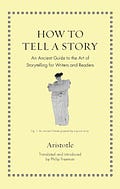[Based on How to Tell a Story: An Ancient Guide to the Art of Storytelling for Writers and Readers, by Aristotle, translated by Philip Freeman. Full book series here.]
Aristotle is such a towering figure in the landscape of western philosophy and intellectual history that during the Middle Ages—both in Christendom and in the Arab world—he was often referred to simply as the philosopher. He was born in Macedonia in an aristocratic family. His father was King Amyntas II’s (Alexander the Great’s grandfather) personal physician.
When his father Nicomachus died, Aristotle, then aged 17, left Macedonia for Athens, where he went to study at Plato’s Academy. He left the school only after Plato’s death in 347 BCE, eventually arriving at the island of Lesbos with the intent to study marine life.
In 342 BCE he was recalled to Macedon by King Philip II, to become the mentor of the teenage Alexander, whom Aristotle managed to influence greatly. When Alexander began his military career and empire building Aristotle returned to Athens to found his own school, the Lyceum.
The death of Alexander brought about a series of struggles for his succession, as well as revived anti-Macedonian sentiments in Athens. In 323 BCE Aristotle prudently left the city, saying that he didn’t want to given its citizens the chance to repeat the same blunder they had made by killing another philosopher (i.e., Socrates) a few decades prior. He died of natural causes in his sixties on the island of Euboea, in the Aegean Sea.
Aristotle wrote about two hundred books, of which only thirty survive. Moreover, he apparently wrote two sets of works, one for the general public and one for his own students. Referring to Aristotle’s public writings, Cicero says that if Plato’s prose was silver, Aristotle’s was a flowing river of gold (Academica I.38.119). Unfortunately, none of those books has reached us. What we have instead are the equivalent of lecture notes, which makes Aristotle notoriously difficult to follow for both ancient commentators and modern readers.
Alfred Whitehead famously said that western philosophy can be understood as a series of footnotes to Plato, and there is some truth to this purposefully exaggerated remark. But there is also a reason why Aristotle has been so prominent for two millennia. He wrote about every conceivable subject, more so even than Plato himself, exploring logic, metaphysics, ethics, political philosophy, aesthetics, the arts, physics, and biology.
Princeton Press’ How to Tell a Story, translated by Philip Freeman as part of the ongoing Ancient Wisdom for Modern Readers series, presents us with a contemporary language version of the Poetics, Aristotle’s study of literature. The book has far more depth than it is implied by the title, which is justified by the fact that at the time pretty much all literature—from epics to tragedies to comedies—was written in verse. In reality, the Poetics contains invaluable advice to anyone who is intent on telling a story, and it is just as valid now as it was 23 centuries ago. Indeed, even contemporary authors who write for new media such as cinema and television could learn a thing or two from this book.
These are some of the take home messages, as we would put it today, from the Poetics:
(i) All storytelling is a kind of imitation, in a sense being an activity not very different from painting. The stories we tell, even when entirely made up, are about the world as we experience it, and are meant to help us better understand it.
(ii) Every story has an appropriate length, and it is incumbent on the author of the story to find the right balance between being too short and therefore unsatisfying and being too long and therefore overbearing. I wish that more modern authors took this lesson to heart…
(iii) Stories must have a beginning, middle, and end. With all due respect to experimental literature, most of us enjoy narratives that respect this rule and don’t get lost in endless meanderings or, worse, fall into incoherence.
(iv) Spectacle is secondary to story line. Which is why so many action / superheroes movies are spectacular failures that do not endure.
(v) Plot is more important than characters. Some authors disagree, and there is a genuinely interesting discussion to be had here. But by and large I am with Aristotle: while strong and nuanced characters are crucial, they can’t hold the narrative edifice by themselves.
(vi) The best conflict occurs between family and friends. It’s too easy to make villains out of strangers. It’s when the betrayal, or the unexpected turn of events, comes from someone close by that things really get interesting and, well, dramatic!
(vii) The most satisfying tragic stories are about good people who make mistakes. Again, the cartoonish, Disney-style villain is simply not that interesting. It is when otherwise good people begin to walk the path of badness that we can’t help being captivated.
The Poetics begins with a treatment of epics and tragedy. Heartbreakingly, it ends with the words “And now let us turn to comedy…” because Aristotle’s treatment of that genre is entirely lost to the sands of time. (Umberto Eco wrote an entire novel based on a speculation of what Aristotle might have written in the lost section of the Poetics.)
Here are some highlights from How to Tell a Story, with accompanying brief commentaries:
“Almost everyone is marked by either a good or a bad character, since it is by virtue or vice that the character of a person is known. People imitated by artists can be better than us, worse than us, or much the same as us.” (Objects—What Are Your Characters Like?)
The stories we tell are about human beings, and specifically about their character. Because character, and the actions that stem from it, truly define who we are. Even when we invent stories about aliens living on other planets, either those aliens are reflections of ourselves, or the story is about how we react to what the aliens do and the sort of beings they are.
Literature and story telling in general are explorations of the human condition, which is why they are so crucial to our understanding of such condition. And without understanding there is no possibility of critical evaluation, and therefore of positive change.
This in turns ought to make it obvious that the current trend toward the reduction or elimination of the humanities in schools and colleges —allegedly to make room for more “practical” and “career oriented” STEM fields—is a disaster in the making for current and future generations alike.
“Aeschylus was the first playwright to increase the number of speaking actors from one to two, making the actors the focus of the drama and reducing the importance of the chorus. Sophocles then introduced a third actor and painted scenery.” (The History of Tragedy)
What I find fascinating about this passage is that it clearly shows just how close Aristotle was to the very beginning of storytelling through writing, at least in the western tradition. It was only one or two generations before him that by now obvious advances—like increasing the number of actors, decreasing the importance of the chorus, or paying attention to the appearance of the scene—were made.
“Epic is like tragedy in the sense that it is an imitation in poetic meter of noble people (unlike comedy). But epic is different because it uses a single meter and is narrated. Epic and tragedy also differ in length, with tragedy when possible having its action take place within a single day or perhaps a little longer. But epic is not bound within a certain time period.” (How Is Epic Different from Tragedy?)
We still use the word “epic” today to indicate action that takes place at grand scales, both spatial and, more crucially, temporal. And just like in Aristotle’s time we still enjoy both epic stories and more narrowly focused, even intimate, tragedies.
That, again, is because our art imitates reality, where events unfold at different scales and with different import. We enjoy this variety, however, so long as the narration respects Aristotle’s fundamental rules, including proper length and internal coherence.
“Since tragedy is an imitation of action performed by certain agents, the agents should have qualities in respect to character and reasoning, for the character and reasoning of a person are what define his or her actions and thus success or failure. Plot is the imitation of action—and by plot I mean how the events and incidents in the tragedy are organized. Character is what makes an agent behave in a certain way. Reasoning is what actors say in a tragedy to argue a case or put forward their views.” (The Parts of Tragedy)
The three chief components of every story, according to Aristotle, are plot, character, and reasoning. The plot has to be intelligible and lacking in contradictions; the characters of the protagonists have to make understandable why they act, or fail to act, in certain ways; and such actions have to be accounted for by the characters’ reasoning, either explicitly or at least implicitly. If the author of a story fails at any of these three components the story itself loses credibility or interest for us.
“The fourth element of tragedy is speech. By this I mean, as I said before, the use of words to express meaning. This is true in both poetry and prose. Of the remaining elements of tragedy, music is the most important of those that give pleasure. As for spectacle (how things appear onstage), it can certainly evoke emotion, but it isn’t really much of an art and has very little to do with poetry. … Such things as visual effects really belong to the craft of producers rather than poets.” (The Other Elements of Tragedy)
Stories are communicated through speech, of course, which is why the language used by the various characters is so important and needs to be well thought out by the author. It is not credible, for instance, to have an uneducated, if smart, individual sound like a member of the intelligentsia. Then again, the speech has to be compelling and varied enough to hold our interest while we are reading or listening.
Notice then Aristotle’s comment about the importance of music, which still accompanies modern storytelling in a number of its forms, from some on-stage productions to, obviously, movies and television series.
Finally, I love the dig at too much emphasis on special effects, even though of course Aristotle couldn’t have imagined the marvels of modern computer-generated visuals. The power of the story has to do with actors, performance, plot, character, and the like. To rely on special effects as substitutes for these may indicate good craftsmanship, but is the hallmark of a poor poet.
[Next in this series: How to be content with Horace. Previous installments: I, II, III, IV, V, VI, VII.]






> Plot is more important than characters. Some authors disagree, and there is a genuinely interesting discussion to be had here.
Definitely an interesting discussion! Another proverbial layer would be the meta-writing by Lajos Egri, who posited that characters and plot are the same thing.
Massimo, more awesome teaching - and more wonderful learning for me!